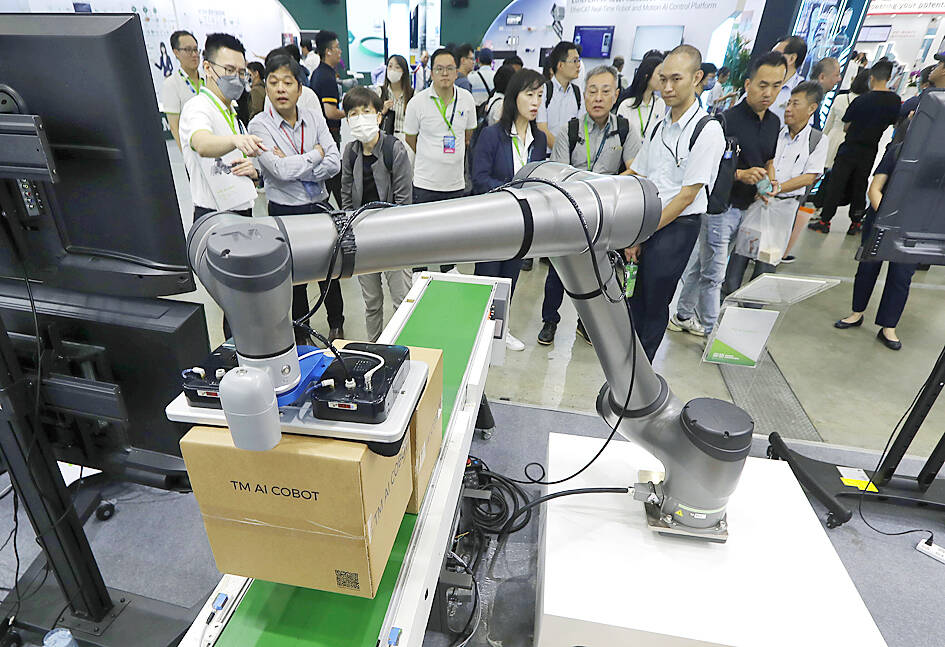Investments in fixed assets in Taiwan’s manufacturing sector rose 28.1 percent in the second quarter as semiconductor suppliers moved to expand production, the Ministry of Economic Affairs (MOEA) said in a report issued on Wednesday last week.
Manufacturers’ fixed asset investments, which refer to funds put into factories, machinery, equipment and other durable capital goods but excluding the purchase of land, totaled NT$620.5 billion (US$20.53 billion) in the second quarter, up from NT$484.3 billion a year earlier, the report said.
Last quarter’s figure was also up 1.5 percent from NT$611.4 billion a quarter earlier, it said.

Photo: Chiang Ying-ying, AP
The ministry in the report said the electronics component industry saw fixed asset investments in the April-to-June period rise 37.3 percent from a year earlier to NT$451.8 billion, accounting for 72.8 percent of the total.
The growth reflected a growing appetite among semiconductor firms, such as pure play wafer foundry operators, integrated circuit (IC) packaging and testing service providers and memory chip suppliers, to expand production and upgrade technologies to meet global demand for emerging applications, such as in the field of artificial intelligence, the ministry said.
Fixed asset investments in the computer and optoelectronics industry in the second quarter surged 64.1 percent from a year earlier to NT$19.9 billion due to anticipated rising demand in the AI era, it said.
In the old economy sector, the oil and coal industry added NT$16.8 billion in fixed asset purchases in the second quarter, up 1.3 percent from the same period a year earlier, backed by an increase in investment by state-own companies, the ministry said.
The base metal sector made NT$15.5 billion in fixed investments during the quarter, up 25.7 percent from a year earlier as steel producers spent more on low carbon and smart production and on annual maintenance, it said.
Also among old economy industries, the chemical materials and fertilizer industry totaled NT$22.7 billion in fixed asset investments in the second quarter, up 9.8 percent from a year earlier as some petrochemical firms sought to upgrade equipment or boost capacity, the ministry said.
Bucking the uptrend, the machinery sector saw a 1.5 percent year-on-year decline in fixed asset investment in the second quarter at NT$10 billion on expected lower demand as some clients had just completed the construction of new facilities, it said.
That weakness was somewhat offset by demand for machinery from semiconductor producers eager to expand capacity, it added.
Sales posted by Taiwan’s manufacturing sector in the second quarter hit NT$8.88 trillion, up 10.5 percent from a year earlier and up 8.9 percent from a quarter earlier, the report said.
The increase was largely due to strong global demand for AI, high performance computing devices and cloud services, while the non-tech economy saw clients’ buying interest affected by uncertainties in international trade, it said.

CHIP RACE: Three years of overbroad export controls drove foreign competitors to pursue their own AI chips, and ‘cost US taxpayers billions of dollars,’ Nvidia said China has figured out the US strategy for allowing it to buy Nvidia Corp’s H200s and is rejecting the artificial intelligence (AI) chip in favor of domestically developed semiconductors, White House AI adviser David Sacks said, citing news reports. US President Donald Trump on Monday said that he would allow shipments of Nvidia’s H200 chips to China, part of an administration effort backed by Sacks to challenge Chinese tech champions such as Huawei Technologies Co (華為) by bringing US competition to their home market. On Friday, Sacks signaled that he was uncertain about whether that approach would work. “They’re rejecting our chips,” Sacks

It is challenging to build infrastructure in much of Europe. Constrained budgets and polarized politics tend to undermine long-term projects, forcing officials to react to emergencies rather than plan for the future. Not in Austria. Today, the country is to officially open its Koralmbahn tunnel, the 5.9 billion euro (US$6.9 billion) centerpiece of a groundbreaking new railway that will eventually run from Poland’s Baltic coast to the Adriatic Sea, transforming travel within Austria and positioning the Alpine nation at the forefront of logistics in Europe. “It is Austria’s biggest socio-economic experiment in over a century,” said Eric Kirschner, an economist at Graz-based Joanneum

BUBBLE? Only a handful of companies are seeing rapid revenue growth and higher valuations, and it is not enough to call the AI trend a transformation, an analyst said Artificial intelligence (AI) is entering a more challenging phase next year as companies move beyond experimentation and begin demanding clear financial returns from a technology that has delivered big gains to only a small group of early adopters, PricewaterhouseCoopers (PwC) Taiwan said yesterday. Most organizations have been able to justify AI investments through cost recovery or modest efficiency gains, but few have achieved meaningful revenue growth or long-term competitive advantage, the consultancy said in its 2026 AI Business Predictions report. This growing performance gap is forcing executives to reconsider how AI is deployed across their organizations, it said. “Many companies

France is developing domestic production of electric vehicle (EV) batteries with an eye on industrial independence, but Asian experts are proving key in launching operations. In the Verkor factory outside the northern city of Dunkirk, which was inaugurated on Thursday, foreign specialists, notably from South Korea and Malaysia, are training the local staff. Verkor is the third battery gigafactory to open in northern France in a region that has become known as “Battery Valley.” At the Automotive Energy Supply Corp (AESC) factory near the city of Douai, where production has been under way for several months, Chinese engineers and technicians supervise French recruits. “They